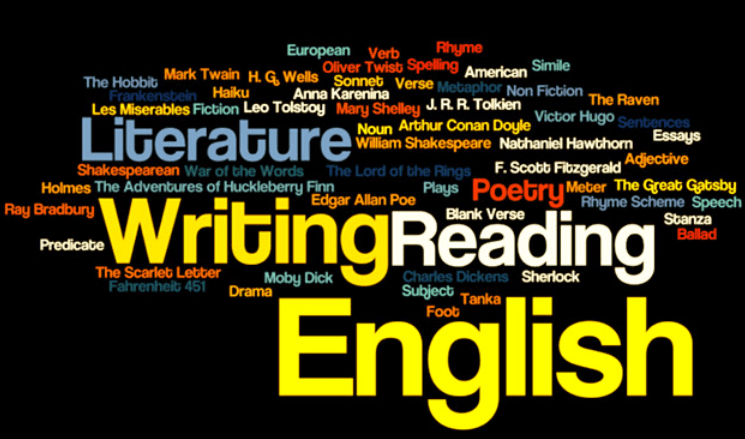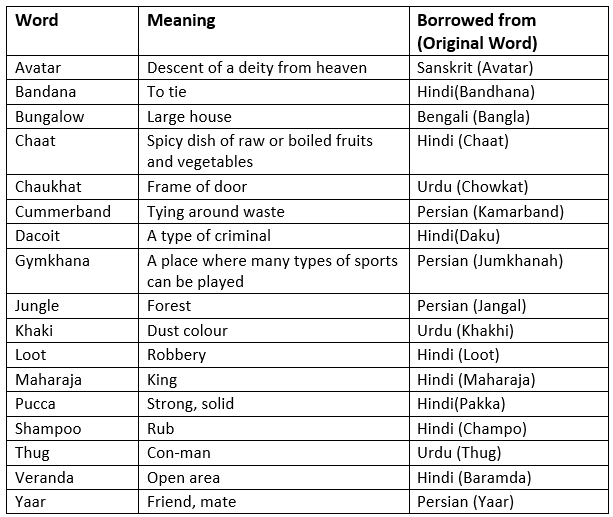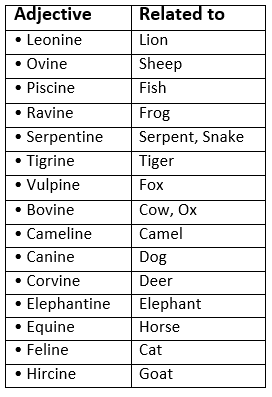Notes: Language and Literature | GK Olympiad for Class 5 PDF Download
| Table of contents |

|
| Introduction |

|
| Animal Adjectives |

|
| Idioms and Phrases |

|
| Analogy: Understanding Similarities Between Objects |

|
| Famous Authors |

|
| Mythology |

|
| Famous Books |

|
Introduction

- Words are the building blocks of every language.
- Using words correctly is crucial for conveying the message we intend to share.
- The organized use of words shapes a language.
- Language serves as the primary means of communication among individuals.
- Even birds, animals, and insects have their own forms of communication, which can be considered their unique languages.
History of Indian Languages
- Languages spoken in India primarily originate from two ancient families:
- Early Dravidian Family: This family gave rise to modern languages such as Telugu, Kannada, Tamil, and Malayalam.
- Indo-Aryan Family: This family led to the development of languages like Bengali, Sanskrit, Hindi, and Marathi.
- Some popular languages spoken outside of India include:
1. English
2. French
3. German
4. Spanish
5. Chinese
6. Russian
7. Urdu
8. Arabic
9. Persian
10. Italian
Loan Words
- A loan word is a word that has been borrowed from one language and used in another language.
- This happens when different communities interact with each other and share words.
- When the British ruled over many parts of the world, they borrowed words from the languages spoken in those regions.
- As a result, a lot of words in the English language are actually loan words from Indian languages.
Here are some common loan words that are used in English but originally come from Indian languages:
- Shampoo: This word comes from the Hindi word "chāmpo," which means to massage or knead.
- Jungle: The word "jungle" comes from the Hindi word "jangal," which means a forest or wild land.
- Pyjamas: This word comes from the Hindi word "pāyjāma," which refers to loose-fitting trousers worn for sleeping.
- Veranda: The word "veranda" comes from the Hindi word "varandā," which means a roofed platform or balcony.
- Thug: The word "thug" comes from the Hindi word "ṭhag," which means a swindler or cheat.

Animal Adjectives
Animal adjectives help describe qualities or traits similar to those of animals. Here are some common animal adjectives:

Idioms and Phrases
- To break the ice: To start the conversation by getting over the feeling of restraint.
- Add insult to injury: To act in a way that makes a bad or displeasing situation worse.
- Caught between two stools: When someone is not able to decide between two options
- To carry a thing too far: To continue it beyond what is safe
- To catch one’s eye: To attract one’s notice by being seen or to come under one’s notice
- To catch it: To achieve the most continued goal
- Feel a bit under the weather: To feel ill
- To come of age: To become an adult
- To cut short: To shorten what is likely to be lengthy
- To do good: To act in a manner that others benefit
- To fall out: To quarrel
- To get rid of To get free from a thing
- To go a long way: To go to a great length
- To hold one’s tongue: To be silent
- To hold one’s head high: To bear oneself proudly
- To keep within bounds: To keep within limits
- To play into the hands of others: To act as to be of advantage to another
- To put to shame: To make someone ashamed or to disgrace
- To stand in another man’s shoes: To occupy another man’s place
- To take a thing in hand: To attempt
- To throw dust in one’s eyes: To deceive one
- To see eye to eye: To agree
- A slap on the wrist: A mild punishment
- A wet blanket: Any person that dampens enthusiasm
- A wild goose chase: Unprofitable
- A hot potato: Current issue about which many people are talking
- To live in a fool’s paradise: To keep false hopes
- The ins and outs: Secrets
- An eye-wash: A pretence
- A penny for your thoughts: Asking someone about his/her thoughts
- At the drop of a hat: Immediately
- Out of the question: Not possible
- To throw cold water: To discourage
Analogy: Understanding Similarities Between Objects
Analogy is all about finding similarities between two different objects or concepts. It's like comparing apples to oranges to see how they are alike in some way.
Types of Analogies
There are various types of analogies that help us understand these similarities better:
- Relation Analogy: This type of analogy shows how two pairs of words are related in the same way.
For example: Father: Mother:: Uncle: Aunt - Parts to Whole Analogy: In this analogy, one word in each pair is a part of the other.
For instance: Cells: Tissues:: Organ: Organ System - Place-Person Analogy: This analogy relates a person to a specific place.
For example: Hospital: Doctor:: Post Office: Postman - Cause and Effect Analogy: Here, one word is the effect of the other.
For instance: Thirst: Drinking:: Cold: Sneezing - Place Analogy: This type of analogy relates to two places in some manner.
For example: Lucknow: Uttar Pradesh:: Bhopal: Madhya Pradesh - Synonym Analogy: In this analogy, the words in each pair are synonyms (words with similar meanings).
For example: Compulsory: Necessary:: Come: Arrive - Antonym Analogy: Here, the words in each pair are antonyms (words with opposite meanings).
For example: Above: Below:: Boon: Curse
Famous Authors
Rabindranath Tagore:
- Known as Gurudev and Kobiguru, Tagore was a celebrated Bengali poet and writer.
- He was the first Indian and first non-European to receive the Nobel Prize in Literature.
- Among his notable works are Gitanjali, Gora, Bhikharini, Chaturanga, Shesher Kobita, Jogajog, and Ghare-Baire.
- He uniquely composed national anthems for two countries: Jana Gana Mana for India and Amar Shonar Bangla for Bangladesh.
- The Sri Lankan national anthem also draws inspiration from his works.
Munshi Premchand:

- Born as Dhanpat Rai Srivastava, he is regarded as one of India’s most respected writers, known as the “Upanyas Samrat.”
- His famous works include Godaan, Karambhoomi, Gaban, Mansarovar, Idgah, and Soz-e-Watan.
- Over his career, he wrote more than 300 short stories and 14 novels.
- Many of his works have been translated into English and Russian.
Khushwant Singh:
- A renowned international author, Singh's most acclaimed works include:
1. Train to Pakistan (inspired by India’s partition)
2. The Mark of Vishnu
3. A History of the Sikhs
4. Delhi: A Novel
5. Gods and Godmen of India
6. The Portrait of a Lady
7. He received the Padma Vibhushan, India’s second-highest civilian honour.
Sarojini Naidu:
- Known as the Nightingale of India, Naidu played a key role in India’s independence movement and also served as the President of the Indian National Congress.
- Her well-known works include:
1. Maher Muneer
2. The Golden Threshold
3. In the Bazaars of Hyderabad
4. The Broken Wing
5. The Feather of the Dawn
Chetan Bhagat:
- Bhagat is the author of three non-fiction books and nine novels.
- His popular works include:
1. Five Point Someone
2. One Night at the Call Centre
3. The 3 Mistakes of My Life
4. Half Girlfriend
5. 2 States
6. Revolution 2020
7. Making India Awesome
8. India Positive
Arundhati Roy
- Roy’s most well-known works are The God of Small Things, The Banyan Tree, We Are One: A Celebration of Tribal Peoples, My Seditious Heart, and The Ministry of Utmost Happiness.
- She received the Man Booker Prize in 1997 for The God of Small Things.
William Shakespeare:
- Shakespeare was an English playwright, poet, and actor, often regarded as the World’s Greatest Dramatist.
- His renowned works include:
1. Hamlet
2. Romeo and Juliet
3. Othello
4. King Lear
5. Macbeth
6. The Comedy of Errors
7. Julius Caesar
8. As You Like It
9. All’s Well That Ends Well
10. The Merchant of Venice
Enid Mary Blyton:
- Blyton is celebrated for her children’s literature.
- She is best known for popular series such as Noddy, Famous Five, Secret Seven, and Malory Towers.
- Additionally, she wrote novels like The Secret Island, The Land Far Beyond, and Brer Rabbit.
Charlotte Brontë:
- Brontë was an English novelist and poet.
- Her first novel, The Professor, was rejected, but her second novel, Jane Eyre, gained her fame.
- Other notable works include Shirley and The Tenant of Wildfell Hall.
Mythology
- Indian Mythology has some well-known sacred texts. These are:
Vedas: There are four Vedas:
- Rig Veda: Written around 1200 BCE, it is the oldest scripture in the world.
- Yajur Veda
- Sam Veda
- Atharva Veda
Mahakavyas: There are two great poems called Mahakavyas:
- Mahabharata: This is the longest poem ever written, with over 200,000 shlokas (couplets). It tells the story of the biggest war ever fought between two groups: the Kauravas, led by Duryodhana, and the Pandavas, led by Yudhishthira.
- Ramayana: This story is about Ram, the legendary prince of Ayodhya. He is the son of King Dashratha and the husband of Sita (also known as Janaki). Ram fought and defeated the demon king Ravan, who had kidnapped Sita.
Famous Books

|
8 videos|19 docs|27 tests
|
FAQs on Notes: Language and Literature - GK Olympiad for Class 5
| 1. What are animal adjectives and how are they used in sentences? |  |
| 2. Can you explain some common idioms and phrases related to animals? |  |
| 3. How do analogies help in understanding similarities between objects? |  |
| 4. Who are some famous authors known for their contributions to literature? |  |
| 5. What are some popular myths or stories from mythology? |  |




















